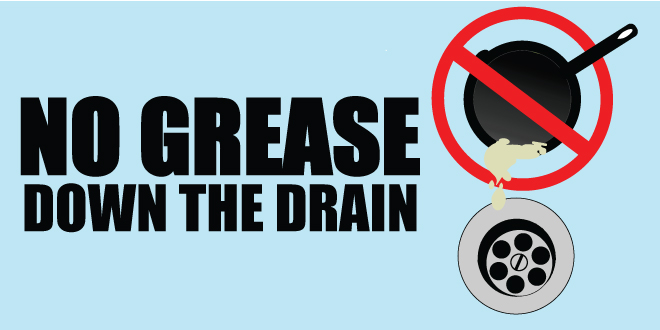Do not pour fats, oils and grease down the drain.
The Problem
Grease hardens when cooled, and along with fats and oils, forms globs that stick to walls inside sewer pipes. This restricts wastewater flow and can clog the pipes leading to sewer overflows into parking lots and streets. Foods that float in the dish water should not go down the drain, and foods that fall to the bottom of the sink when washing belong in the trash, too.
The damage:
- Unsanitary public health conditions that breed bacteria, combined with bad odors and high cleanup costs for homeowners, food-service establishments and public works departments.
- Several million dollars lost each year spent unclogging greasy fats, oils and grease (FOG) inside our sewer pipes.
- Several more millions lost to increase spending on the interference caused by FOG slowing down our sewage treatment plant process, affecting the pumps and generators that clean our wastewater.
- FOG-related violations impact FOG Discharge Control Permit regulations that can cause monetary penalties that affect the bottom line at food-service establishments.
In Fiscal Year 2018-19, the Miami-Dade Water and Sewer Department had 604 stoppages at a cost of $483,200.00 caused by items – including grease that shouldn’t have been put down the drain.
The Solution
The best, harmless approach to cleaning is to wipe the cooking equipment of the fats, oils and grease before washing it. When cooking with oil, make sure to cool it, can it and trash it. If each of us changed this habit and stopped pouring grease down the drain, we could decrease system-wide clogged pipes.
After you are done cooking:
- Pour the hot grease into a metal can
- Let it cool down
- Then throw the can into the regular trash
Remember, Can it. Cool it. Trash it.
—
To work effectively, our sewer system must be properly maintained from the drain all the way to the treatment plant.
Currently, Miami-Dade County and its municipalities, along with the County’s sewer system infrastructure, is under Federal Court Order to correct existing problems.
Details about required upgrades and operational changes, including reducing the amount of fats, oils and grease in sewer pipes, can be read in the settlement with the U.S. Environmental Protection Agency and other federal organizations.
Learn more at miamidade.gov/environment/fats-oils-grease.
 City of Sunny Isles Beach Official Website
City of Sunny Isles Beach Official Website
